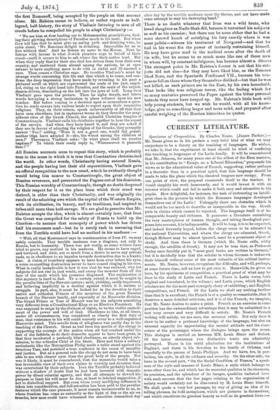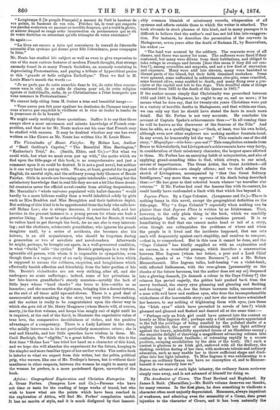CURRENT LITERATURE.
Specimens of Composition. By Charles Nests. (James Parker.)— Mr. Neste gives us in his preface a very brief hint of what we may conjecture to be a theory on the teaching of languages. He wishes, we take it, that the experiment at least should be tried of confining this teaching to languages of the Latin family. It will be remembered that Mr. Johnson, for many years one of the ablest of the Eton masters, in his contribution to "Essays on a Liberal Education," propounds his views as to the educational value of French, suggesting, rather perhaps in a theoretic than in a practical spirit, that this language should be made to take the place which the classical tongues now occupy. From one point of view, the proposal commends itself to the teacher. It would simplify his work immensely, and it would invest it with an interest which could not fail to make it both easy and attractive to his pupils. How delightful, for instance, the task of instructing an intelli- gent class in the process by which the Romano° languages developed themselves out of the Latin ! Unhappily there are obstacles which it would not be too much to describe as insuperable in the way. Greek puts in claims which cannot be rejected. The language itself is of in- comparable beauty and richness. It possesses a literature containing the very masterpieces of human thought, and taking theological pur- poses into account, it is indispensable. It will be long, it is to be expected, and indeed fervently hoped, before the clergy cease to be educated in the national Universities, and where the clergy are educated, Greek, though Hebrew may be almost ignored, must be a prominent object of study. And then there is German (which Mr. Neate calls, oddly enough, the satellite of Greek). It may not be true that, as Professor Seeley once forcibly put it, most good books are written in Gern3an," but it is decidedly true that the scholar to whom German is unknown finds himself without some of the most valuable of his critical instru- ments. Mr. Neste, however, recognises the difficulty, and will, perhaps, at some future time, tell us how to get over it. Meanwhile, he gives us here, by his specimens of composition, a practical proof of what may be done in the study of Latin and French. There is Latin verse, both original and translated, in the volume ; and Latin prose, which English scholars are for the most part strangely chary of exhibiting ; and English compositions, and French. Of the Latin we shall say nothing further than that it is excellent; the French is of a quality so remarkable, that it deserves a more detailed criticism, and it is of the French, we imagine, that Mr. Neste desires to make a point. French as an exercise in com- position has the extraordinary advantage that it may be submitted to a test very severe and very difficult to satisfy. Mr. Neate's French writing will satisfy, we are sure, the severest critic. Not only does it show in its author a profound knowledge of the language, but also an unusual capacity for appreciating the mental attitude and the char- acters of the personages whom the dialogue brings upon the scone. This dialogue is carried on between MM. Louis Blanc and Guizot. Of the latter statesman two distinctive traits are admirably portrayed. There is his vivid admiration for the institutions of England, and there is his devotion to the family of Orleans, and especially to the person of Louis Philippe. And we have, too, in per- fection, his style, in all its coldness and severity. On the other side, we have in the second part, "On the Social Condition of France," a speci- men of the style and manner of Louis Blanc, a style which belongs to none other than he, and which has its essential qualities in its clearness, its precision, and the splendour of its images, qualities imitated here with such success that the few pages relating to the organisation of society would certainly not be disavowed by M. Louis Blanc himself. We shall quote a very few passages, by way of giving an idea of its telling phrases, its bold metaphors, which are pictures in themselves, and which constitute its greatest beauty as well as its greatest force :—
" Longtemps ii [le peuple Francais] a mesure de l'ceil la hauteur de vos palais, is bassesse de vas ron. Prechez lui, le vent qui emporte vos paroles soulevera en passant ce terrible drapeart, qui a reale la gloire, et autour duquel se range cette insurrection en permanence qui se rit de votre doctrine en attendant qu'elle triomphe de votre resistance." So again :— "Le Eyre eat encore a faire qui convaincra le travail de niternelle necessitd d'un systkme qui donne pour file l'abondance, pour compagne la faim."
Mr. Neate has studied his subject so well as even to give expression to one of the most curious features of modern French thought, that strange anomaly found in so many French Socialists, an anomaly consisting in depreciating Protestantism, and paying a tribute of hypocritical praise to this "grande et belle religion Catholique." Thus we find in Ai. Louis Blanes mouth the words :—
"Jo no pane pas de cette anarchie dans la foi, de cette libre concnr- rence vers le ciel, de ce culte de chacun pour soi, de cette religion egoista et individuelle' enfin, de ce Christianisme l'etat bourgeois quo Tons nommez le Protestantisme."
We cannot help citing from M. Gaizot a true and beautiful image :—
"Vous aurez pen fait pour egaliser lea destindes de l'homme tent quo Tolls n'aurez pas emptche la vieillesse et le vice de fouler Is tombe de la jennessee et de is beante."
We might easily multiply these quotations. Suffice it to say that these essays show a most uncommon and minute knowledge of French com- position, and that so far Mr. Neate makes out his ease that French may be studied with success. It may be doubted whether any one has ever written so like Cicero as Mr. Neste has written like M. Louis Blanc.



































 Previous page
Previous page